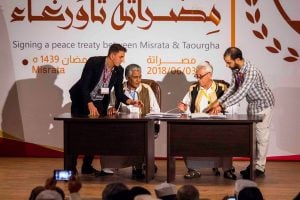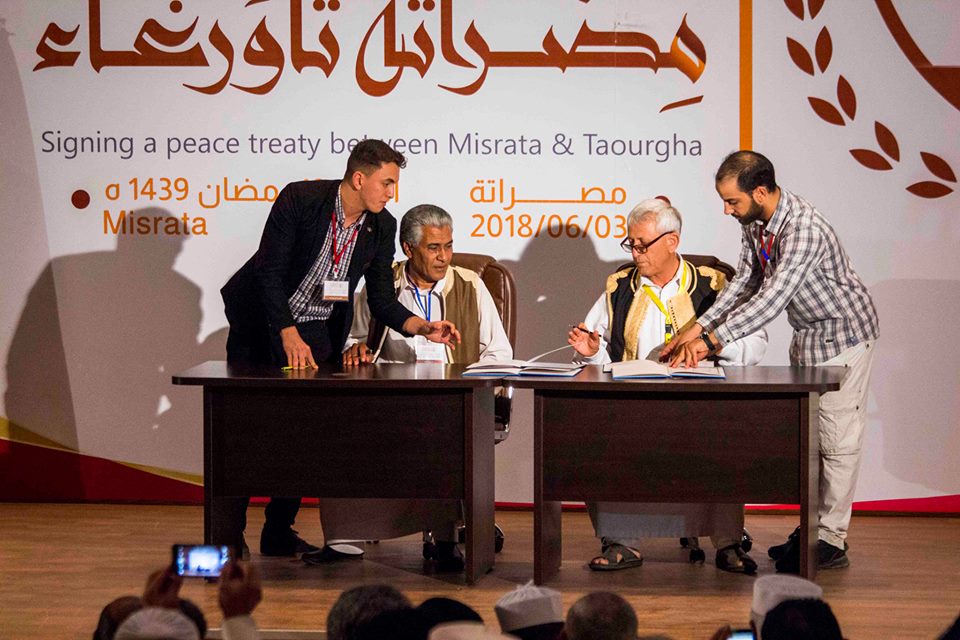By Sami Zaptia.

London, 4 June 2018:
Representatives of the city of Misrata and the town of Tawerga signed a reconciliation pact between the two in Misrata yesterday. The agreement could pave the way for the return of more than 40,000 Tawerghans to their home town for the first time since the Libyan revolution of 2011 that had ousted the 42-year Qaddafi dictator and his regime.
The peace agreement stipulated that Tawergha and Misratah should be coordinated in decisions of public interest, and that those wanted for justice and those belonging to terrorist or extremist groups should not be accommodated by either side.
The two parties will also cooperate in the search for missing persons and guidance to their graves and the search for mass graves, as well as the cessation of all negative media campaigns towards one another and the supervision of the parties to reaction to situations that would provoke discord.
The agreement also provided for the continuation of the “exceptional” Tawergha Local Council until the return of Tawergha to its previous administrative status and the guarantee of return to the town for those who had been residing in it prior to the February 2011 revolution, with the central region and the Misrata Security Directorate taking responsibility for ensuring the safe return for the Tawergha people, and the commitment of the concerned state authorities to fulfil their obligations under the Agreement.
The agreement was welcomed by the Presidency Council (PC).
It will be recalled that an agreement for the return of the people of Tawergha to their town on 1 February had been agreed in June 2017.
The agreement had been signed in Tripoli at the Prime Ministry office in the presence of PC head Faiez Serraj and his deputy Ahmed Maetig, himself from Misrata, and the minister for displaced persons, Yousef Jalalah.
Serraj had promised to provide all required infrastructure services to Tawergha and his Deputy Ahmed Maetig had said that PC would supervise the return of residents so that they were safe and secure. The reconciliation agreement had stipulated compensation for both communities for damages suffered.
However, on 1 February Misrata Municipal Council asked the Presidency Council (PC) to postpone the return of Tawerghans to their town, saying that a peace agreement between the town and Misrata had not been fully implemented. It accused “some parties” of not being interested in putting in place the deal. It was understood that the lack of financial remuneration to Misrata was one of the issues, but also that the bodies of Misratan fighters killed in 2011 had not been found and that certain Tawerghan fugitives remained at large.
A convoy of 100 Tawerghan families who had left from Ajdabiya were stopped near Bin Jawad on the road to Sirte. It was believed they were unable to receive permission from Bunyan Al-Marsous to cross any further.
In response, the Serraj PC had accused unnamed parties of “seeking to undermine the agreement” and had called on all those involved to work towards returning the people to Tawergha safely.
During the Libyan 2011 revolution Tawergha largely supported Qaddafi and some fighters were accused of sexually assaulting Misratans and mutilating revolutionary fighters.
https://www.libyaherald.com/2018/02/02/misrata-blocks-return-of-tawergha/
https://www.libyaherald.com/2017/06/19/serraj-overseas-new-misrata-tawergha-agreement/







